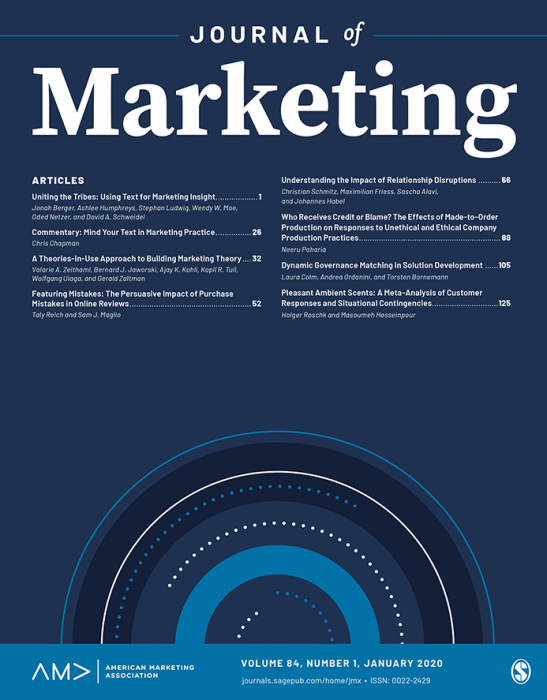EXPRESS: The Collective Identity Effect: How Group-Level Identity Influences Individual Behavior
IF 10.4
1区 管理学
Q1 BUSINESS
引用次数: 0
Abstract
This study investigates group-level customer–company identification (CCI), extending social identity theory to explore how individual-level identification evolves into strong, collective group dynamics. By analyzing interconnected customer groups, the research demonstrates how these dynamics shape individual behavior and drive organizational outcomes across diverse group types. Drawing on a comprehensive, three-year data set from a national retailer, the study assesses collective CCI within these groups. The findings reveal that group-level CCI significantly influences individual CCI, which in turn affects consumer spending and share of wallet. Furthermore, the research identifies the optimal conditions for maximizing group influence, highlighting that moderately sized (10-20 members), homogenous groups that meet three to ten times per year have the greatest impact. These insights enhance the understanding of CCI by focusing on group-level effects and extending social identity theory to address the conditions under which group-level identification exerts the strongest influence. The study offers practical strategies for managers to build group cohesion, foster loyalty, and improve customer interactions by leveraging group dynamics across organizational, social, and consumer contexts.集体认同效应:群体认同如何影响个人行为
本研究探讨群体层面的顾客-公司认同(CCI),扩展社会认同理论,探讨个人层面的认同如何演变成强烈的集体群体动力学。通过分析相互关联的客户群体,该研究展示了这些动态如何塑造个人行为并推动不同群体类型的组织成果。该研究利用一家全国性零售商三年的综合数据集,评估了这些群体中的集体CCI。研究发现,群体层面的CCI显著影响个体CCI,个体CCI进而影响消费者支出和钱包份额。此外,研究确定了最大化群体影响力的最佳条件,强调中等规模(10-20名成员)、每年聚会三到十次的同质群体具有最大的影响力。这些见解通过关注群体层面效应和扩展社会认同理论来解决群体层面认同产生最强影响的条件,增强了对CCI的理解。该研究为管理者提供了实用的策略,以建立团队凝聚力,培养忠诚度,并通过利用跨组织,社会和消费者环境的团队动态来改善客户互动。
本文章由计算机程序翻译,如有差异,请以英文原文为准。
求助全文
约1分钟内获得全文
求助全文
来源期刊

Journal of Marketing
BUSINESS-
CiteScore
24.10
自引率
5.40%
发文量
49
期刊介绍:
Founded in 1936,the Journal of Marketing (JM) serves as a premier outlet for substantive research in marketing. JM is dedicated to developing and disseminating knowledge about real-world marketing questions, catering to scholars, educators, managers, policy makers, consumers, and other global societal stakeholders. Over the years,JM has played a crucial role in shaping the content and boundaries of the marketing discipline.
 求助内容:
求助内容: 应助结果提醒方式:
应助结果提醒方式:


